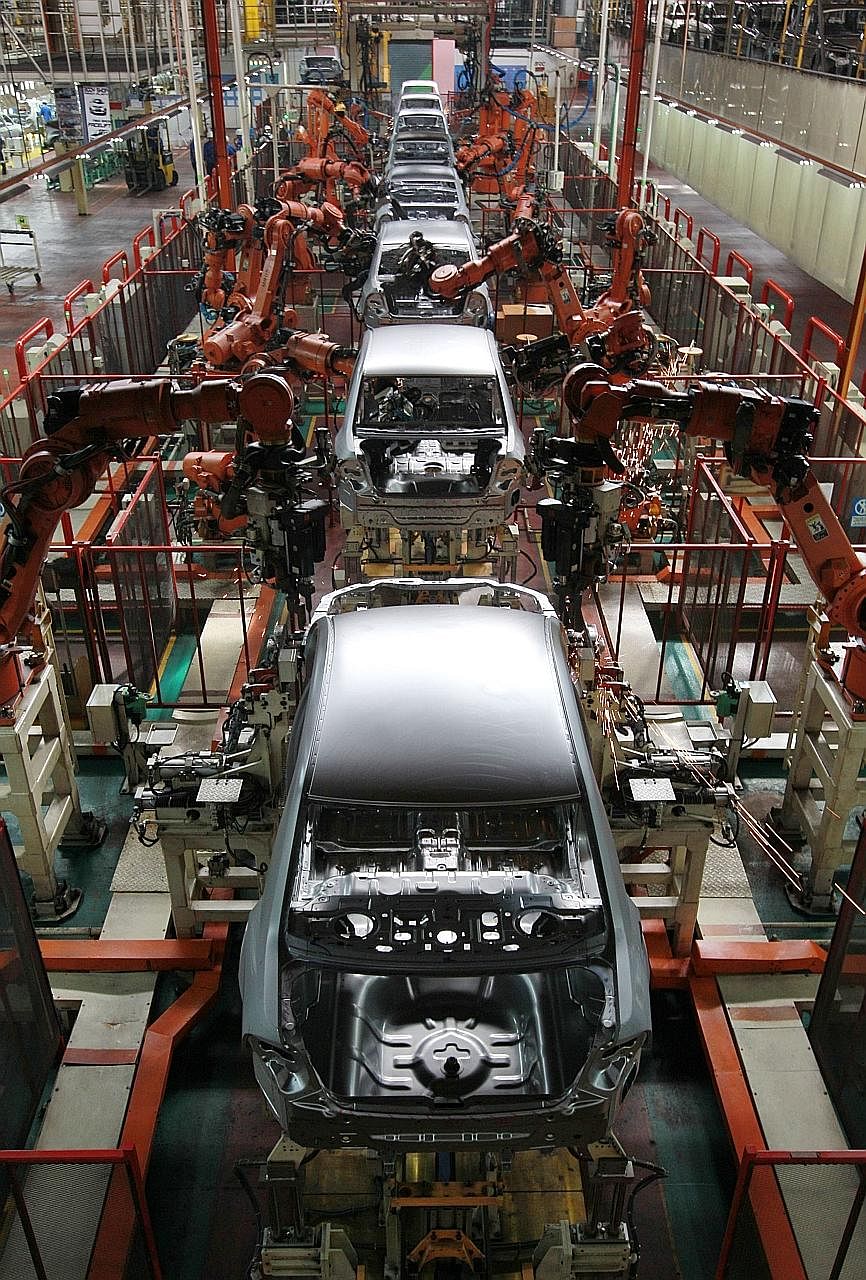Malaysia's political crisis is slowly finding its way to the country's corporate boardrooms - and embattled carmaker Perusahaan Otomobil Nasional Bhd (Proton) is emerging as a potential casualty.
Proton is on the ropes, struggling with woes ranging from mounting debts to slumping sales and a deficit of cash to pay its suppliers. The firm that has bled losses of more than RM2.5 billion (S$850 million) for the last four years wants the government to hand it an urgent S$500 million grant, to stay afloat.
But that request is now threatened by the political spat between Tun Dr Mahathir Mohamad, who founded Proton in the mid-1980s as a national car project and is currently its very hands-on chairman, and Prime Minister Najib Razak.
Employees of the carmaker, who are staring at job losses, and parts suppliers, who are struggling to get paid by Proton, fear that they are likely to become scapegoats in the ongoing political bickering.
"They (employees) and vendors are being asked to choose between Dr Mahathir and the (Najib) government," said a senior Proton executive, who spoke on condition of anonymity. The executive added that there is widespread respect for Dr Mahathir, who remains the company's No. 1 supporter. "But there is a growing sense that he is now a liability."
Proton declined official comment for this article.
Since early last year, Dr Mahathir has publicly called for Datuk Seri Najib's resignation over allegations of economic mismanagement and corruption. He ratcheted up his campaign last month when he resigned from the ruling Umno party to spearhead a citizens' movement to dislodge Mr Najib.

The Najib government and Umno have lashed back. In a sign of growing annoyance with Dr Mahathir's actions, the government removed him two weeks ago from the prestigious position as adviser to the national oil corporation Petronas, a move that has gained widespread approval in Umno. The government cannot sack Dr Mahathir from Proton. The company, which started business as a state entity, is now owned entirely by DRB-Hicom Bhd, a conglomerate controlled by businessman Syed Mokhtar Albukhary.
But the troubled carmaker desperately needs government support and the Mahathir factor is starting to prove to be more of a burden than a benefit for DRB-Hicom, which also relies heavily on government-awarded business.
How the Najib administration handles the crisis at Proton will have far-reaching repercussions for the auto sector that employs more than 500,000 workers and is estimated to contribute more than RM30 billion to the country's gross domestic product annually.
Proton alone has 10,000 employees and the wider ecosystem of parts suppliers and other related services is estimated to employ nearly 30,000 people. Already the cutback in production at Proton is hurting its parts suppliers, who are now being offered unsold cars as payment, while employees are grappling with the prospect of layoffs.
Proton has yet to file its latest financial results. But investment analysts tracking Malaysia's auto sector say the carmaker is losing close to RM25 million each month because of interest charges on loans and the financial load on its growing stockpile of unsold cars. Industry executives estimate it has about 30,000 units of unsold cars, or roughly three months' worth of inventory based on last year's sales of just over 102,000 units.
Dr Mahathir started Proton in 1985 with help from Mitsubishi as the cornerstone of his industrialisation push that called for billions of dollars in investments to finance the setting up of steel and cement facilities. But many of those projects failed because of mismanagement and Proton is the last of his flawed industrialisation plan.
Proton struggled initially. But due to protectionist policies that made imported models very expensive and out of range for most Malaysians, the company turned around to become the country's top-selling carmaker.
But the gradual liberalisation of the domestic auto market since Dr Mahathir left office in 2003 has resulted in Proton's market share plunging from a high of more than 60 per cent in the 1990s. For the whole of last year, Proton sold 102,175 cars - 15.3 per cent of 666,674 vehicles sold in Malaysia.
The other national carmaker Perodua, which is partly owned by Daihatsu, took 32 per cent of total sales. Honda and Toyota were at third and fourth places with just over 14 per cent market share each, according data from the Malaysia Automotive Association.
Dr Mahathir, who has the final say on major decisions in Proton, believes it has a future and a government grant to fund research and development for a new engine will make the firm viable again.
Industry executives and Malaysian government officials are not convinced.
"Even if Proton receives a grant, it won't solve the company's troubles," said a financial consultant, who has done work for Proton and the Malaysian government.
Government officials say the days of Kuala Lumpur playing the role of banker of last resort for the car manufacturer are over. The government has resolved that its three-decade policy of nurturing a national car project under Proton has failed and its priority now is the introduction of policies that will bring duties and tariff structures in line with Asean's plan to create a common economic community.
The Najib administration also wants to turn Malaysia into a regional hub for the development of electric cars, and exploratory talks are under way with Tesla of the United States, officials say.
The only option available to Proton is a strategic tie-up with a global carmaker. Talks are under way between Proton and Japan's Suzuki, which is hoping to make a push into the Asean car market. But Proton has a bad track record for forging alliances. A proposed tie-up with Germany's Volkswagen in 2011 was scuttled because of Malaysia's refusal to surrender management control of the national carmaker.

